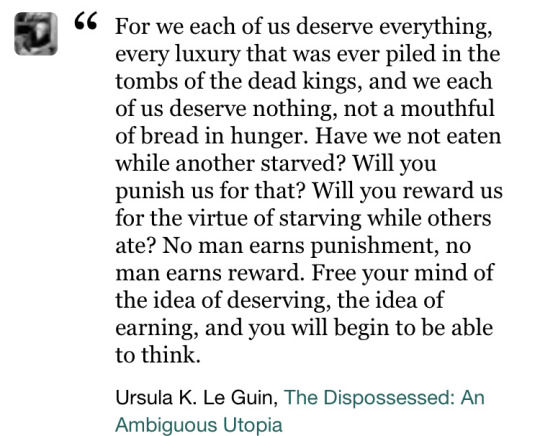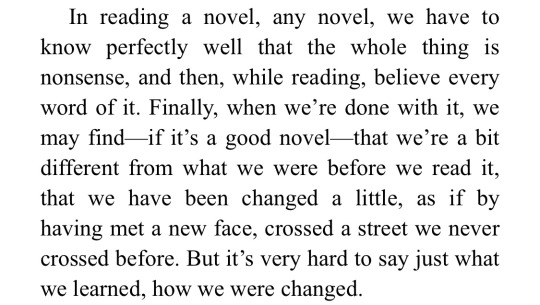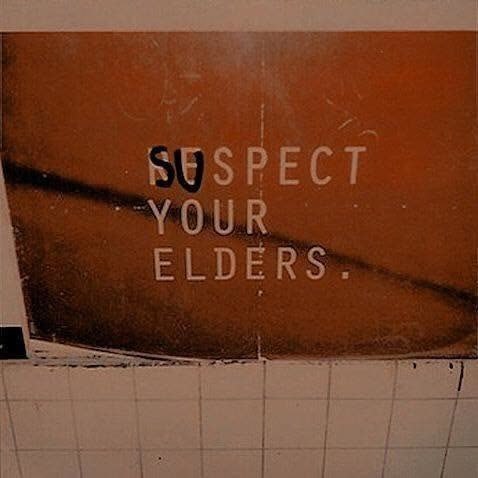#ursula le guin quotes
Text
So, as the mageborn will, Ged made his fear and regret into a song, a brief lament, halfsung, that was not for himself alone.
Ursula K. Le Guin, A Wizard of Earthsea
#book quotes#ursula le guin#ursula k. le guin#ursula le guin quotes#books and libraries#fantasy literature#literature#a wizard of earthsea#earthsea
86 notes
·
View notes
Text

— Ursula K. Le Guin, from “A Rant About ‘Technology’”
44K notes
·
View notes
Text

It’s an Ursula k le Guin free your mind from the idea of deserving kind of day
32K notes
·
View notes
Text
A good writer, like a good reader, has a mind’s ear. We mostly read prose in silence, but many readers have a keen inner ear that hears it. Dull, choppy, droning, jerky, feeble: these common criticisms of narrative are all faults in the sound of it. Lively, well-paced, flowing, strong, beautiful: these are all qualities of the sound of prose, and we rejoice in them as we read. Narrative writers need to train their mind’s ear to listen to their own prose, to hear as they write.
- Ursula K. Le Guin, Steering the Craft: A 21st Century Guide to Sailing the Sea of Story
#quote#ursula k. le guin#steering the craft#writeblr#writing#writing advice#writing tips#writing resources#writing quotes#dexterreads
9K notes
·
View notes
Text
"The idea of reforming Omelas is a pleasant idea, to be sure, but it is one that Le Guin herself specifically tells us is not an option. No reform of Omelas is possible — at least, not without destroying Omelas itself:
If the child were brought up into the sunlight out of that vile place, if it were cleaned and fed and comforted, that would be a good thing, indeed; but if it were done, in that day and hour all the prosperity and beauty and delight of Omelas would wither and be destroyed. Those are the terms.
'Those are the terms', indeed. Le Guin’s original story is careful to cast the underlying evil of Omelas as un-addressable — not, as some have suggested, to 'cheat' or create a false dilemma, but as an intentionally insurmountable challenge to the reader. The premise of Omelas feels unfair because it is meant to be unfair. Instead of racing to find a clever solution ('Free the child! Replace it with a robot! Have everyone suffer a little bit instead of one person all at once!'), the reader is forced to consider how they might cope with moral injustice that is so foundational to their very way of life that it cannot be undone. Confronted with the choice to give up your entire way of life or allow someone else to suffer, what do you do? Do you stay and enjoy the fruits of their pain? Or do you reject this devil’s compromise at your own expense, even knowing that it may not even help? And through implication, we are then forced to consider whether we are — at this very moment! — already in exactly this situation. At what cost does our happiness come? And, even more significantly, at whose expense? And what, in fact, can be done? Can anything?
This is the essential and agonizing question that Le Guin poses, and we avoid it at our peril. It’s easy, but thoroughly besides the point, to say — as the narrator of 'The Ones Who Don’t Walk Away' does — that you would simply keep the nice things about Omelas, and work to address the bad. You might as well say that you would solve the trolley problem by putting rockets on the trolley and having it jump over the people tied to the tracks. Le Guin’s challenge is one that can only be resolved by introspection, because the challenge is one levied against the discomforting awareness of our own complicity; to 'reject the premise' is to reject this (all too real) discomfort in favor of empty wish fulfillment. A happy fairytale about the nobility of our imagined efforts against a hypothetical evil profits no one but ourselves (and I would argue that in the long run it robs us as well).
But in addition to being morally evasive, treating Omelas as a puzzle to be solved (or as a piece of straightforward didactic moralism) also flattens the depth of the original story. We are not really meant to understand Le Guin’s 'walking away' as a literal abandonment of a problem, nor as a self-satisfied 'Sounds bad, but I’m outta here', the way Vivier’s response piece or others of its ilk do; rather, it is framed as a rejection of complacency. This is why those who leave are shown not as triumphant heroes, but as harried and desperate fools; hopeless, troubled souls setting forth on a journey that may well be doomed from the start — because isn’t that the fate of most people who set out to fight the injustices they see, and that they cannot help but see once they have been made aware of it? The story is a metaphor, not a math problem, and 'walking away' might just as easily encompass any form of sincere and fully committed struggle against injustice: a lonely, often thankless journey, yet one which is no less essential for its difficulty."
- Kurt Schiller, from "Omelas, Je T'aime." Blood Knife, 8 July 2022.
#kurt schiller#ursula k. le guin#quote#quotations#the ones who walk away from omelas#trolley problem#activism#introspection#discomfort#reform#revolution#suffering#ethics#morality
10K notes
·
View notes
Text
I think to topple the devine rights of kings billionaires, we need to dispel the myth that they have that money because they are smart and worked hard and make good decisions
I think the zip ties on the submarine and the limited views on the advertising platform might begin to show them for what they are
They are not smarter than you. They are not better than you. And if you suddenly magically got all that money people would stop saying 'no' to you too. and that is not a good thing
#oceangate#Twitter#Billionaires#Ursula le guin was right#Ah lads#I googled her for the quote#And just realised she died#Aaah now im sad
13K notes
·
View notes
Text
“We all have forests on our minds. Forests unexplored, unending. Each one of us gets lost in the forest, every night, alone.”
Ursula K. Le Guin
9K notes
·
View notes
Text
...that doesn't mean I'm predicting that in a millennium or so we'll all be androgynous, or announcing that I think we dammed well ought to be androgynous. I'm merely observing, in the peculiar, devious, and thought-experimemtal manner proper to science fiction, that if you look at us at certain odd times of the day in certain weathers, we already are.
Ursula K. Le Guin in the Author's Note (1976) to The Left Hand of Darkness (1969)
3K notes
·
View notes
Quote
My imagination makes me human and makes me a fool; it gives me all the world, and exiles me from it.
Ursula K. Le Guin
#Ursula K. Le Guin#motivation#quotes#poetry#literature#relationship quotes#writing#original#words#love#relationship#thoughts#lit#prose#spilled ink#inspiring quotes#life quotes#quoteoftheday#love quotes#poem#aesthetic
522 notes
·
View notes
Quote
My imagination makes me human and makes me a fool; it gives me all the world, and exiles me from it.
Ursula K. Le Guin
#Ursula K. Le Guin#motivation#quotes#poetry#literature#relationship quotes#writing#original#words#love#relationship#thoughts#lit#prose#spilled ink#inspiring quotes#life quotes#quoteoftheday#love quotes#poem#aesthetic
621 notes
·
View notes
Text

Ursula K. Le Guin, “Author’s Note” from The Left Hand of Darkness
739 notes
·
View notes
Quote
After all, [the world] is on my side. That is, I'm a part of it. Not separate from it. I walk on the ground and the ground's walked on by me, I breathe the air and change it, I am entirely interconnected with the world.
Ursula K. Le Guin, The Lathe of Heaven
#q#lit#quotes#prose#ursula k. le guin#the lathe of heaven#all these wonders still to be ours#i was a bride married to amazement#reading#archive#m#x
14K notes
·
View notes
Text

When he found that the administrators were upset, he laughed.
"Do they expect students not to be anarchists?" he said. "What else can the young be? When you are on the bottom, you must organize from the bottom up."
— Ursula K Le Guin, The Dispossessed: An Ambiguous Utopia
330 notes
·
View notes
Text
"For we each of us deserve everything, every luxury that was ever piled in the tombs of the dead kings, and we each of us deserve nothing, not a mouthful of bread in hunger. Have we not eaten while another starved? Will you punish us for that? Will you reward us for the virtue of starving while others ate? No man earns punishment, no man earns reward. Free your mind of the idea of deserving, the idea of earning, and you will begin to be able to think."
-Ursula K. Le Guin's The Dispossesed
346 notes
·
View notes
Text
It might seem that the writer needs a gift of mimicry, like an impersonator, to achieve this variety of voices. But it isn’t like that. It’s more like what a serious actor does, sinking self in character-self. It’s a willingness to be the characters, letting what they think and say rise from inside them. It’s a willingness to share control with one’s creation.
- Ursula K. Le Guin, Steering the Craft: A 21st Century Guide to Sailing the Sea of Story
#quote#ursula k. le guin#steering the craft#writing#writeblr#writing advice#writing tips#writing quotes#writing resources#dexterreads
2K notes
·
View notes
Text
"I think Homer outwits most writers who have written on the War [fantasy archetype], by not taking sides.
The Trojan war is not and you cannot make it be the War of Good vs. Evil. It’s just a war, a wasteful, useless, needless, stupid, protracted, cruel mess full of individual acts of courage, cowardice, nobility, betrayal, limb-hacking-off, and disembowelment. Homer was a Greek and might have been partial to the Greek side, but he had a sense of justice or balance that seems characteristically Greek — maybe his people learned a good deal of it from him? His impartiality is far from dispassionate; the story is a torrent of passionate actions, generous, despicable, magnificent, trivial. But it is unprejudiced. It isn’t Satan vs. Angels. It isn’t Holy Warriors vs. Infidels. It isn’t hobbits vs. orcs. It’s just people vs. people.
Of course you can take sides, and almost everybody does. I try not to, but it’s no use; I just like the Trojans better than the Greeks. But Homer truly doesn’t take sides, and so he permits the story to be tragic. By tragedy, mind and soul are grieved, enlarged, and exalted.
Whether war itself can rise to tragedy, can enlarge and exalt the soul, I leave to those who have been more immediately part of a war than I have. I think some believe that it can, and might say that the opportunity for heroism and tragedy justifies war. I don’t know; all I know is what a poem about a war can do. In any case, war is something human beings do and show no signs of stopping doing, and so it may be less important to condemn it or to justify it than to be able to perceive it as tragic.
But once you take sides, you have lost that ability.
Is it our dominant religion that makes us want war to be between the good guys and the bad guys?
In the War of Good vs. Evil there can be divine or supernal justice but not human tragedy. It is by definition, technically, comic (as in The Divine Comedy): the good guys win. It has a happy ending. If the bad guys beat the good guys, unhappy ending, that’s mere reversal, flip side of the same coin. The author is not impartial. Dystopia is not tragedy.
Milton, a Christian, had to take sides, and couldn’t avoid comedy. He could approach tragedy only by making Evil, in the person of Lucifer, grand, heroic, and even sympathetic — which is faking it. He faked it very well.
Maybe it’s not only Christian habits of thought but the difficulty we all have in growing up that makes us insist justice must favor the good.
After all, 'Let the best man win' doesn’t mean the good man will win. It means, 'This will be a fair fight, no prejudice, no interference — so the best fighter will win it.' If the treacherous bully fairly defeats the nice guy, the treacherous bully is declared champion. This is justice. But it’s the kind of justice that children can’t bear. They rage against it. It’s not fair!
But if children never learn to bear it, they can’t go on to learn that a victory or a defeat in battle, or in any competition other than a purely moral one (whatever that might be), has nothing to do with who is morally better.
Might does not make right — right?
Therefore right does not make might. Right?
But we want it to. 'My strength is as the strength of ten because my heart is pure.'
If we insist that in the real world the ultimate victor must be the good guy, we’ve sacrificed right to might. (That’s what History does after most wars, when it applauds the victors for their superior virtue as well as their superior firepower.) If we falsify the terms of the competition, handicapping it, so that the good guys may lose the battle but always win the war, we’ve left the real world, we’re in fantasy land — wishful thinking country.
Homer didn’t do wishful thinking.
Homer’s Achilles is a disobedient officer, a sulky, self-pitying teenager who gets his nose out of joint and won’t fight for his own side. A sign that Achilles might grow up someday, if given time, is his love for his friend Patroclus. But his big snit is over a girl he was given to rape but has to give back to his superior officer, which to me rather dims the love story. To me Achilles is not a good guy. But he is a good warrior, a great fighter — even better than the Trojan prime warrior, Hector. Hector is a good guy on any terms — kind husband, kind father, responsible on all counts — a mensch. But right does not make might. Achilles kills him.
The famous Helen plays a quite small part in The Iliad. Because I know that she’ll come through the whole war with not a hair in her blond blow-dry out of place, I see her as opportunistic, immoral, emotionally about as deep as a cookie sheet. But if I believed that the good guys win, that the reward goes to the virtuous, I’d have to see her as an innocent beauty wronged by Fate and saved by the Greeks.
And people do see her that way. Homer lets us each make our own Helen; and so she is immortal.
I don’t know if such nobility of mind (in the sense of the impartial 'noble' gases) is possible to a modern writer of fantasy. Since we have worked so hard to separate History from Fiction, our fantasies are dire warnings, or mere nightmares, or else they are wish fulfillments."
- Ursula K. Le Guin, from No Time to Spare, 2013.
#ursula k. le guin#homer#quote#quotations#the iliad#trojan war#storytelling#fantasy#fiction writing#war#conflict#tragedy#john milton#paradise lost#greek mythology
2K notes
·
View notes